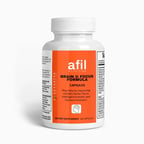Aspergillus Niger
Aspergillus niger intolerance may result from mold allergies, enzyme sensitivity, or mycotoxin exposure. Reducing exposure, choosing non-fungal alternatives, and supporting immunity can help manage symptoms.
🦠 What is Aspergillus Niger?
Aspergillus niger is a common mold used in enzyme production. Though generally safe, it can cause allergies or intolerance in sensitive individuals.
🤔 Why Do I Have an Overgrowth in Aspergillus Niger?
An overgrowth or sensitivity to Aspergillus niger can develop due to several factors that allow this mold to thrive or trigger reactions:
-
Indoor Mold Exposure – Damp or poorly ventilated spaces can harbor mold spores.
-
High Humidity – Warm, moist environments support mold growth.
-
Immune Imbalance – A weakened or overactive immune system may react more strongly.
-
Frequent Enzyme Consumption – Some supplements and processed foods contain A. niger-derived enzymes.
-
Dietary Mold Sources – Aged cheeses, fermented products, or spoiled foods may contain mold.
-
Poor Gut Health – Imbalances in gut flora may reduce resistance to mold-related sensitivities.
🛠️ What Can I Do About It?
- 🧼 Improve Air Quality – Use air purifiers, dehumidifiers, and increase ventilation to reduce indoor mold.
- 🥗 Adjust Your Diet – Avoid foods that may be contaminated with mold, like aged cheese, peanuts, and spoiled produce.
- 🚿 Reduce Moisture – Keep bathrooms, kitchens, and basements dry and clean to prevent mold growth.
- 🌾 Read Ingredient Labels – Avoid supplements or processed foods containing enzymes derived from A. niger (like citric acid or certain amylases).
- 💧 Support Detox Pathways – Stay hydrated and include liver-supportive foods like leafy greens and cruciferous vegetables.
- 🦠 Balance Your Microbiome – Support gut health with fermented foods, fiber-rich meals, and well-tolerated probiotics.
💊 Which Supplements Can Help with an Aspergillus Niger Overgrowth?
- Activated Charcoal – Helps bind and flush out toxins, including mold-related byproducts.
- Milk Thistle (Silymarin) + Quercetin– Supports liver detox and overall immune function.

- NAC (N-Acetyl Cysteine) – Boosts glutathione production and helps break down mucus and biofilms.
- Probiotics – Helps maintain a balanced gut environment and reduce fungal overgrowth.

- Olive Leaf Extract – Has natural antifungal properties and supports immune defense.

- Vitamin C – Strengthens the immune system and helps fight oxidative stress.

🌟 Why Might I Have an Overgrowth in Aspergillus Niger but Not Other Molds?
Here are a few reasons you might experience an overgrowth or sensitivity to Aspergillus niger specifically, while not reacting the same way to other molds:
-
Enzyme Exposure – A. niger is widely used in food processing and supplements for enzyme production (like citric acid or digestive enzymes), which could lead to more frequent exposure.
-
Genetic Sensitivity – Some individuals are more reactive to specific mold species due to immune or histamine-related traits.
-
Environmental Presence – A. niger thrives in indoor air, especially in damp areas like bathrooms or kitchens, which may lead to consistent contact.
-
Mycotoxins – It can produce unique toxins (like oxalic acid) that may affect your body differently than other mold strains.
-
Gut Imbalance – A disrupted microbiome can make your system more vulnerable to overgrowth of opportunistic fungi like A. niger.
🍽️ Foods to Avoid With an Aspergillus Niger Overgrowth
-
Moldy or Aged Foods – Blue cheese, salami, dried fruits, and leftovers stored too long
-
Fermented Products – Soy sauce, vinegar, kombucha, and alcohol (especially wine and beer)
-
Packaged Nuts & Grains – Especially peanuts, corn, and wheat, which may carry mold residues
-
Damp-Stored Foods – Items stored in humid conditions like improperly stored grains, seeds, or legumes
-
Citric Acid Additives – Often derived from A. niger, found in sodas, candies, and many processed foods
-
Sugary Foods – Excess sugar can feed fungal growth and disrupt gut balance
-
Mushrooms & Yeast Products – These may aggravate fungal sensitivities in some people
🍽️ Foods That Support an Aspergillus Niger Overgrowth
-
Sugary Foods – Candy, pastries, soda, and sweetened drinks can fuel fungal growth
-
Fermented Products – Beer, wine, soy sauce, vinegar, and kombucha may contain mold or yeast
-
Mold-Prone Foods – Peanuts, corn, and grains are often contaminated with mold toxins
-
Aged & Cured Meats – Salami, bacon, and aged cheeses can harbor mold
-
Dried Fruits – Raisins, apricots, and figs may contain mold residues if not properly stored
-
Processed Foods with Citric Acid – Used as a preservative, often derived from Aspergillus niger
-
Mushrooms & Yeast-Rich Foods – Can aggravate fungal sensitivities in some individuals
.png?width=100&height=75&name=AFIL%20Logo%20(1).png)